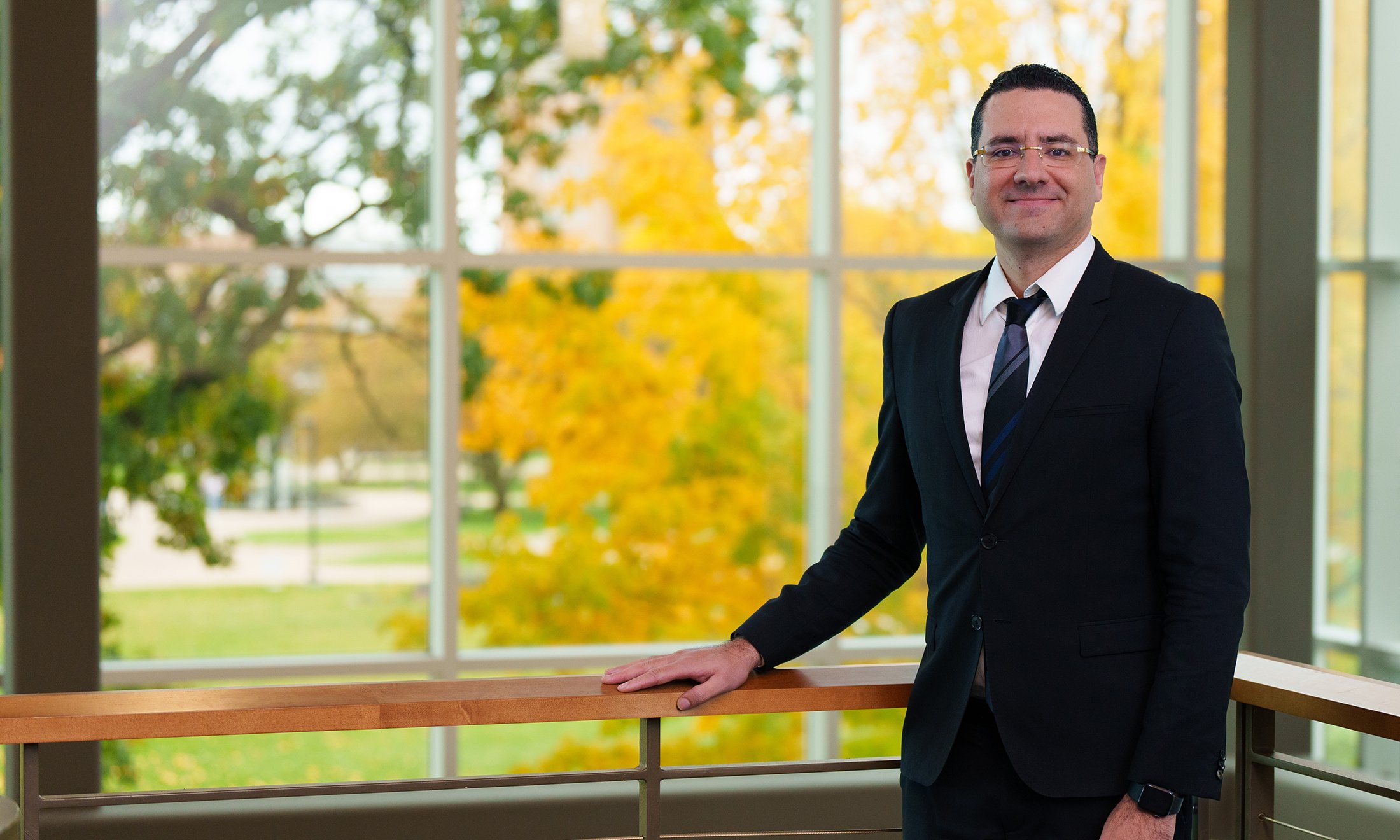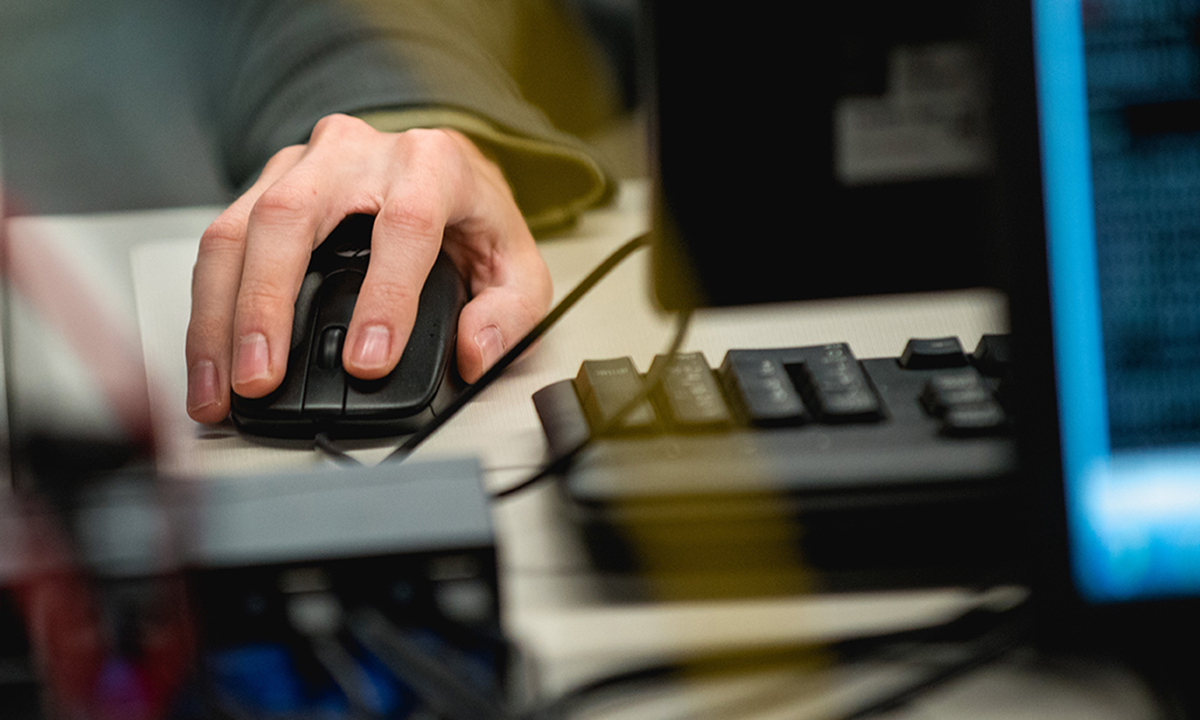Growing Smart
Dr. Marouane Kessentini has been the driving force behind cultivating robust AI research ecosystem at Oakland University.
Ask Marouane Kessentini, Ph.D., professor and chair of the Department of Computer Science and Engineering, what can be done to position Oakland University as a leading institution for large-scale artificial intelligence (AI) research, and he is likely to have some answers. From creating OU Artificial Intelligence Center (OUAI), NSF Center on Pervasive AI and organizing the first OU-IBM workshop, to hosting the 37th IEEE/ACM International Conference on Automated Software Engineering and enabling new partnerships with industry, Dr. Kessentini has been the driving force behind an array of initiatives, aimed at cultivating a robust AI research ecosystem at Oakland University.
Artificial intelligence — intelligence demonstrated by machines, as opposed to humans or animals — can be a very powerful tool with many applications. It is used across all major sectors, such as manufacturing, agriculture, healthcare, retail, banking, financial services, as well as defense and security, but it comes with a tradeoff.
“Businesses and organizations that depend on software have to constantly fix bugs, add new features and improve their code. When new code is introduced, however, the solutions can be far from ideal. And after this process is repeated hundreds of times, the overall code can evolve into a giant tangle of rushed solutions that make future improvements increasingly more difficult. So, we need intelligent bots to fix the software used in all aspects of our society nowadays,” explains Dr. Kessentini, who has published over 190 papers in top software engineering and artificial intelligence journals and earned the reputation of a leading researcher in the areas of intelligent software engineering.
It is not a surprise, therefore, that Dr. Kessentini’s initial involvement with industry stemmed from developing intelligent solutions for pending software engineering and services computing problems, which also highlighted the need for a broader-spectrum collaboration.
“Academia and industry are the two most important stakeholders when it comes to developing economy and enabling innovation. Thus, industry-university partnerships are vital for AI advancements. From this collaboration, industry obtains talent with specialized knowledge and practical training, while academia benefits from opportunities to work on emerging issues and much-needed technologies,” says Dr. Louay Chamra, dean of the School of Engineering and Computer Science.
Since his arrival to OU in January of 2022, Dr. Kessentini has been all about collaborations. He has established the NSF Industry-University Cooperative Research Center (IUCRC) on Pervasive and Personalized AI (PPI) and founded Oakland University Artificial Intelligence Center.
The PPI Center is an industry-focused research center hosted at OU, UC-Boulder, and Oregon State University. “Under the IUCRC model, the pre-competitive and industry-applied research projects are funded by industry members, participating universities and the NSF, enabling an entirely new class of applications in many IoT verticals, such as smart cities, smart cars, smart energy, smart buildings, smart homes, smart manufacturing, smart agriculture, smart retail, smart digital health and fitness and many others,” Dr. Kessentini says, highlighting the value of the partnership.
Likewise, as a hub for promoting comprehensive AI research and translating it into beneficial social and industrial applications, OUAI is also built with partnerships in mind, facilitating interdisciplinary research and teaching environment. The center, which is likely to play a major role in OU’s current research and education landscapes, organizes monthly seminars featuring distinguished AI speakers from academia and industry and offers weekly meetings for students and faculty to share their knowledge and experience in AI.
On a larger scale, in spring of 2022, OUAI welcomed an IBM co-sponsored workshop focused on AI and supply chain analytics in smart manufacturing. Industry attendees leveraged a cloud-based analytics platform for such lab activities as accessing and curating data, using automated AI modeling tools and working with supply chain decision optimization systems.
In the fall, the 37th IEEE/ACM International Conference on Automated Software Engineering, a premier international research forum in software engineering, firmly put Oakland University on the map of AI powerhouses. Hundreds of top researchers and practitioners from academia and industry gathered on OU’s grounds to share their insights on foundations, techniques and tools for automating the analysis, design, implementation, testing and maintenance of large software systems.
“The conference attracted a record number of submitted papers. A total of 774 papers were submitted, including 18 for Students Research Competition,” says Dr. Kessentini, who also acted as a conference general chair.
In 2022, Dr. Kessentini received over $4.5M in competitive research funding to support OU’s 10 AI research projects. He was named the recipient of two distinguished OU awards: Oakland University Researcher of the Year, which recognizes the faculty member with the largest amount of competitive grant funding in the fiscal year, and Oakland University Most Research Active Award, presented to the faculty member awarded the highest number of grants.
“I am very excited that several of the new grants are results of collaboration with the talented OU faculty; I feel that we can really grow an AI ecosystem at OU,” says Dr. Kessentini.
Moving forward, Dr. Kessentini’s plans include expanding collaborative research in AI; enriching and innovating undergraduate and graduate curricula to prepare next-generation workforce and AI leaders who are strong in data science and entrepreneurship; strengthening commitment to diversity in faculty and student recruitment; and expanding an inclusive and engaging community in computing at Oakland University.

 December 18, 2022
December 18, 2022
 By Arina Bokas
By Arina Bokas









